In Which I Learn What it Means to Care for an Elderly Parent
My dad didn't live long enough to become elderly, and I lived thousands of miles away when my mother was dying, but I'm doing my part for my mother-in-law
In the fall of 2011, six years after being diagnosed with Parkinson’s disease, my mother moved from her condo in her beloved Cape Cod to a seniors’ residence in Milwaukee to be closer to my sister. The irony of this was not lost on me: after years of a conflicted relationship during which I lost track of how often my sister told me I was Mom’s favorite and she was (our deceased) Dad’s, Mom opted to move closer to Amy, not to me.
It was largely a matter of geography: Amy lived 1100 miles from Cape Cod. I lived more than twice that far, and on the other side of the border, in Canada. Mom was 83—uprooting herself was going to be challenging enough without throwing in the red tape of immigration. Plus, with her trifecta of movement disorder-related health problems (she also had rheumatoid arthritis and spinal stenosis) there was almost no way she’d be granted permanent resident status, which she’d need to live in my adopted country. Still, I had guilt pangs about the move—partly because it seemed wrong to be thinking of Mom’s living arrangements as a competition and partly because when I saw how much time Amy was spending taking care of her, I couldn’t help thinking that losing the contest also meant I’d dodged a bullet.
Mom lived nearly six and one-half years in Milwaukee, the first two in independent living, the last four in a memory care unit in a nursing home. During that time I visited every three or four months, but Amy, who lived about 10 minutes from the home, did what I thought of as the heavy lifting. It drew her closer to Mom, but it also made her resent me in new ways.
Once, during one of the many fraught interactions we had during that time, Amy referred to me as “The Disneyland Daughter” because from her perspective I was the one who got to have all the fun with Mom (such as it was—watching someone you love go through end-stage Parkinson’s is no fun even if you’re only exposed to it for brief durations).
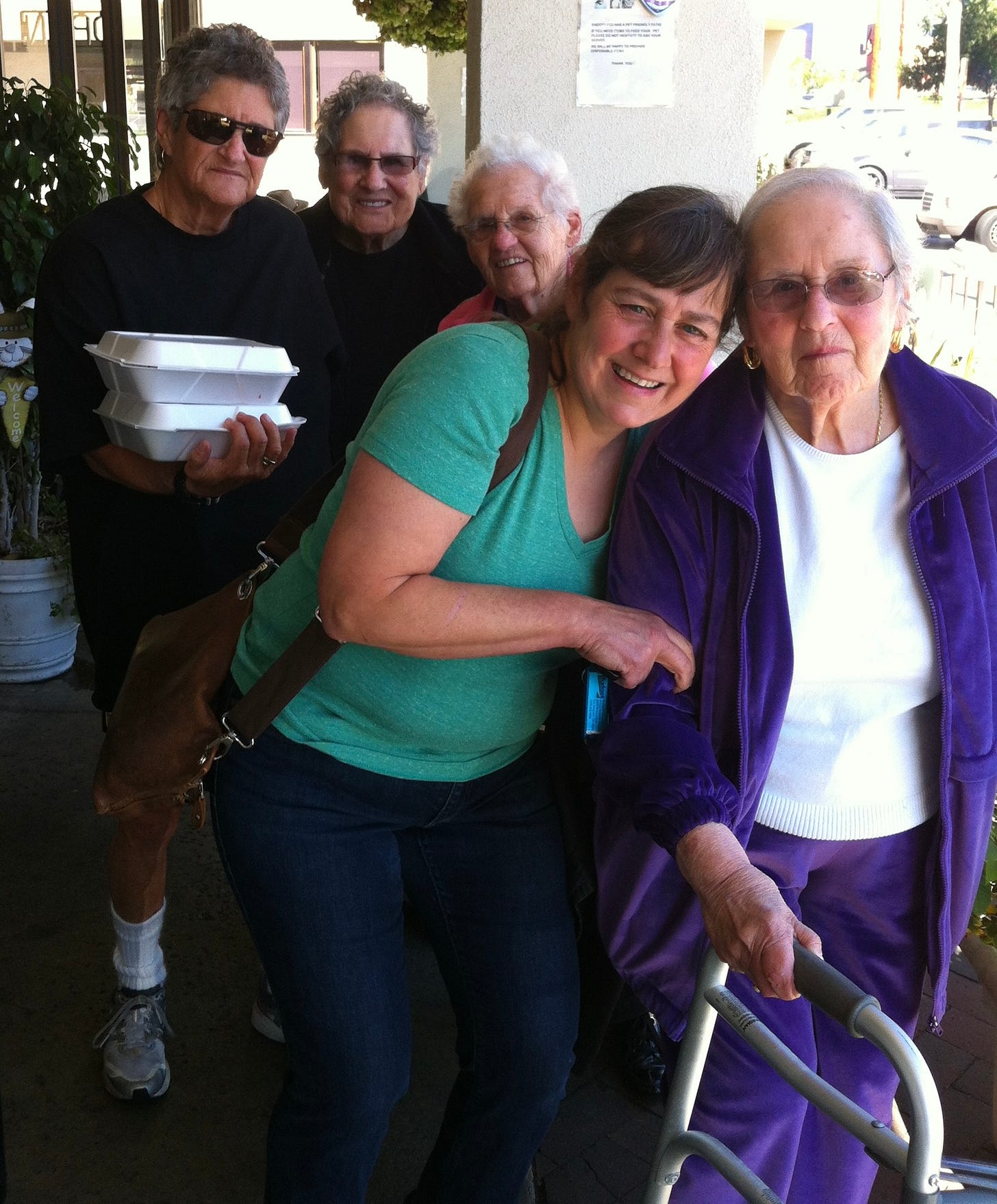
I consoled myself by telling Amy (and myself) that when my in-laws went downhill in Edmonton, I’d be doing the heavy lifting because my husband was the only one of their three kids who lived in town and he works a minimum of 15 hours a day while I have a lighter, more flexible schedule.
When it came to pass, in the winter of 2021, that my father-in-law was diagnosed with lymphoma (from which he has since recovered) and my mother-in-law’s dementia worsened (which it continues to do), David and I became the point people and I never felt I was doing enough. Part of that is my personality: I almost never feel like I’m doing enough. Part of it was that my in-law’s neighbors willingly took on tasks like grocery shopping, which made my job easier but also gave me something else to feel guilty about. Shouldn’t I be doing everything?
Then there was the criticism we faced from my brother-in-law, 17 months younger than my husband, who lives three hours away. When I was feeling charitable, I told myself that he was probably harder on himself for not being around as often as he wished than he was on us for not being as helpful as he thought we should be. But it wasn’t always easy to be charitable.
One of the most important, hard-earned lessons I have learned about dealing with an aging parent: it’s easier when you’re in sync with your sibling(s), rowing in the same direction, appreciating what each of you can bring to the table instead of grousing and squabbling and getting all judgy about about who’s doing more and who’s not doing enough. It took a long time for me and Amy to learn that lesson, but we did, and now I’m relearning it with my in-laws because even though the point is the same, when the people are different, so is the learning curve.
It’s easier to help an aging parent when you’re in sync with your siblings, appreciating what each of you can bring to the table instead of grousing and squabbling and getting all judgy about about who’s doing more and who’s not doing enough.
Another important, hard-earned lesson: caring for an aging parent is easier if you can be kind to yourself. If you’re doing the best you can, then you need to drown out the voices telling you otherwise, regardless of whether they’re in your head or coming out of someone else’s mouth.
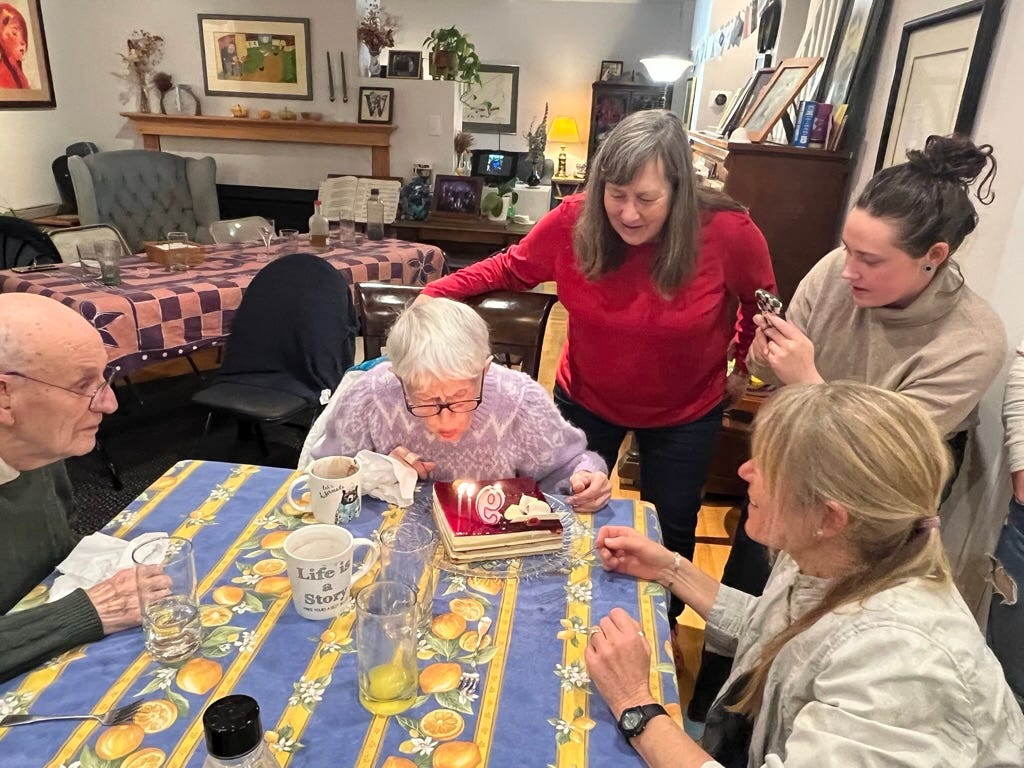
This has been on my mind more recently because my mother-in-law, Pat, who has end-stage Alzheimer’s, was moved to a hospice unit in a hospital less than 10 minutes from our house at the end of January. Before that, she spent nearly three weeks in a hospital in another community being treated for an infection and pneumonia. Because that hospital was more than a half-hour from our house, we’d take turns going. My brother-in-law drove three hours from Calgary a few times, as did his daughter, who took time off from her teaching job to be with her grandmother. My sister-in-law drove more than four hours from her home near the mountains and went for a visit with my husband one evening. My husband’s cousins also visited, usually during lunch to try to get Pat to eat.
Around the time we learned Pat would be going into hospice, I asked David what I would do to make his life easier.
“Come to the hospital with me,” he said. “It’s lonely going there by myself.”
My first thought was, “You never came to the hospital when my mother was sick,” although that wasn’t entirely true—he did come, just not nearly as often as I because Mom lived so far away and also, she wasn’t his mom. But I wanted to be supportive, because it’s hard watching someone you love lose someone they love, knowing there’s nothing you can do to make it better. Loss hurts. There’s no way to avoid it. If you try to avoid it, it merely hurts in other ways, sometimes even worse.
It’s hard watching someone you love lose someone they love. There’s nothing you can do to make it better. Loss hurts. There’s no way to avoid it. If you try to avoid it, it merely hurts in other ways, sometimes even worse.
Since Pat was moved to hospice, David and I have been visiting her every day. And—this has surprised me—it hasn’t felt like heavy lifting at all.
This is my first experience with a hospice, and I’ve been struck by how peaceful and welcoming it is. For a place where people go to die, it’s quite appealing. There’s none of the beeping and bustle of a hospital ward, just private rooms located around a big, quiet common space with couches and tables that I’ve never seen being used by anyone except for the nurses doing paperwork. (The patients all seem to stay in their rooms, in bed.) There’s also a kitchen area with snacks and coffee.
Pat has a spacious, sunny, south-facing room with comfortable chairs for visitors and a refrigerator where we store the Ensure she doesn’t finish during our visits. With the encouragement of the nurses, we’ve been bringing our puppy, Belle, because she can snuggle on the bed with Pat, who loves dogs.
The other day, when Belle was getting feisty, Pat swatted at her and called her Chipper—the dog she had as a newlywed nearly 66 years ago.
A year and a half ago on a trip to Hawaii, David insisted on buying me a guitarlele, a ukulele-sized nylon-string guitar. I’d never heard of such an instrument until my sister brought hers on a trip to Italy four and a half years ago. As a purchase, I thought it was an indulgence, but it was also fun—and the salesman flattered me by telling me that I sounded like a natural (he was a good salesman).
The first time David and I went to the hospice together, he suggested I bring the guitarlele. While he got his mother to drink Ensure, I started making my way through the Rise Up Singing songbook my sister gave to me. Sometimes I play Pat’s favorites, sometimes I play mine. That’s our routine now: Dave feeds his mother while she snuggles with Belle on the bed, and I provide the background music.
The other night our son, Noah, came with us and helped get his grandma to drink Ensure while I sang. This weekend our daughter, Elizabeth, drove up from Calgary. At the hospital on Sunday morning, Dave encouraged me to sing the satirical version of David Mallet’s “The Garden Song,” the lyrics of which I’d discovered in Rise Up Singing a few days before.
I was halfway through the first verse when I realized Elizabeth was crying. “It’s supposed to make you laugh, not cry,” I said, taken aback. When she explained why she was crying, I welled up: watching her father feed his mother had made her realize that he was taking care of her the way she had taken care of him as a child, nourishing him, nurturing him, and now Elizabeth was watching that relationship come full circle. It was like one of her favorite childhood books, Love You Forever, come to life.
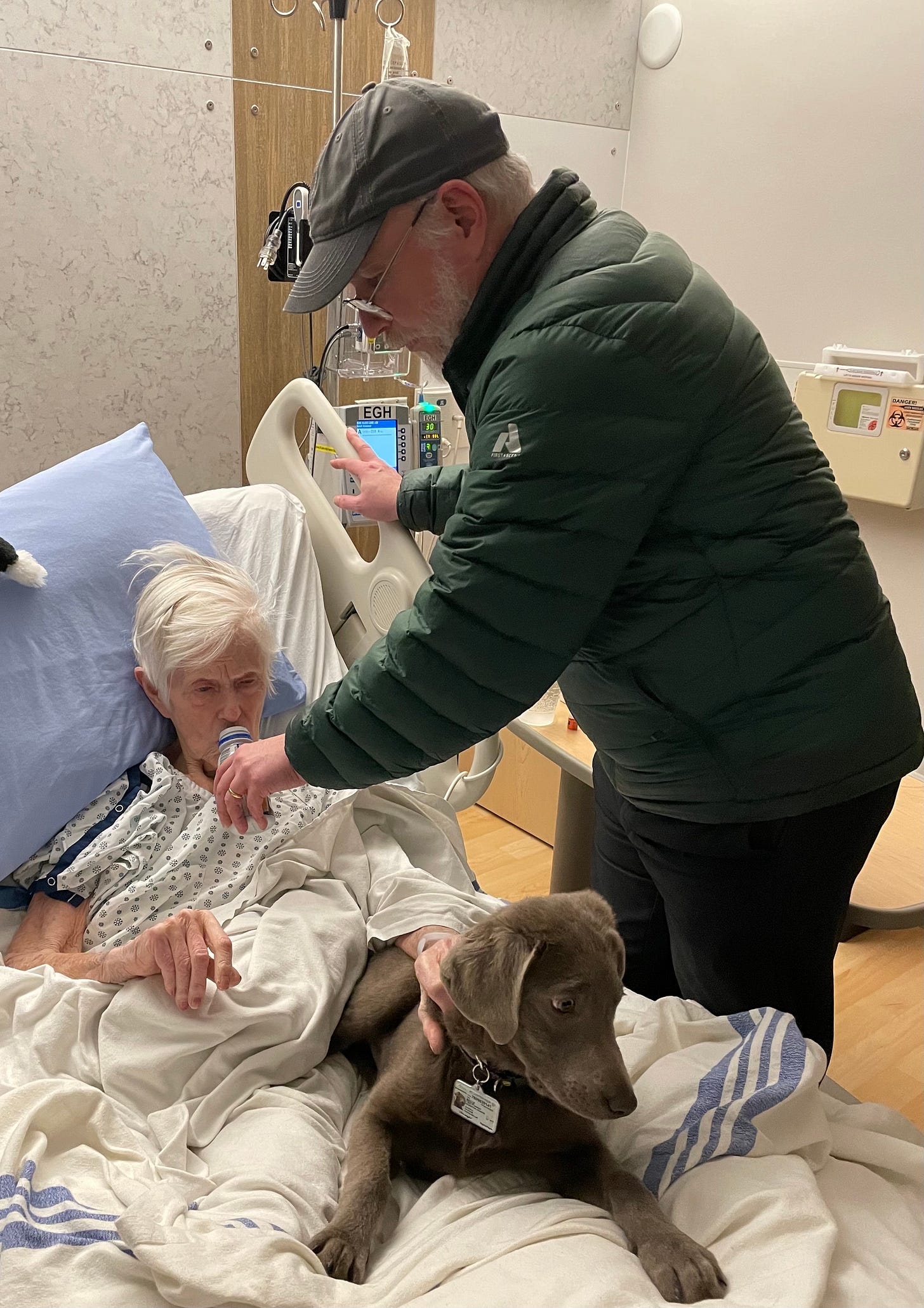
It is a gift to have the opportunity to care for the elders who cared for us. I’ve heard that said, but I’ve never felt it the way I have this past week. My father never lived long enough for me to be able to take care of him, and my mother lived too far away for me to have the opportunity to build caring for her into my daily life. I’m grateful that my mother-in-law lives close enough for me and my husband to be able to have this time with her. I’m grateful that the things that bring her joy—cuddling a puppy, listening to music—are things that don’t feel like burdens to me. Maybe that makes me selfish. I prefer to think it makes me—and everyone in this relationship with me—blessed.


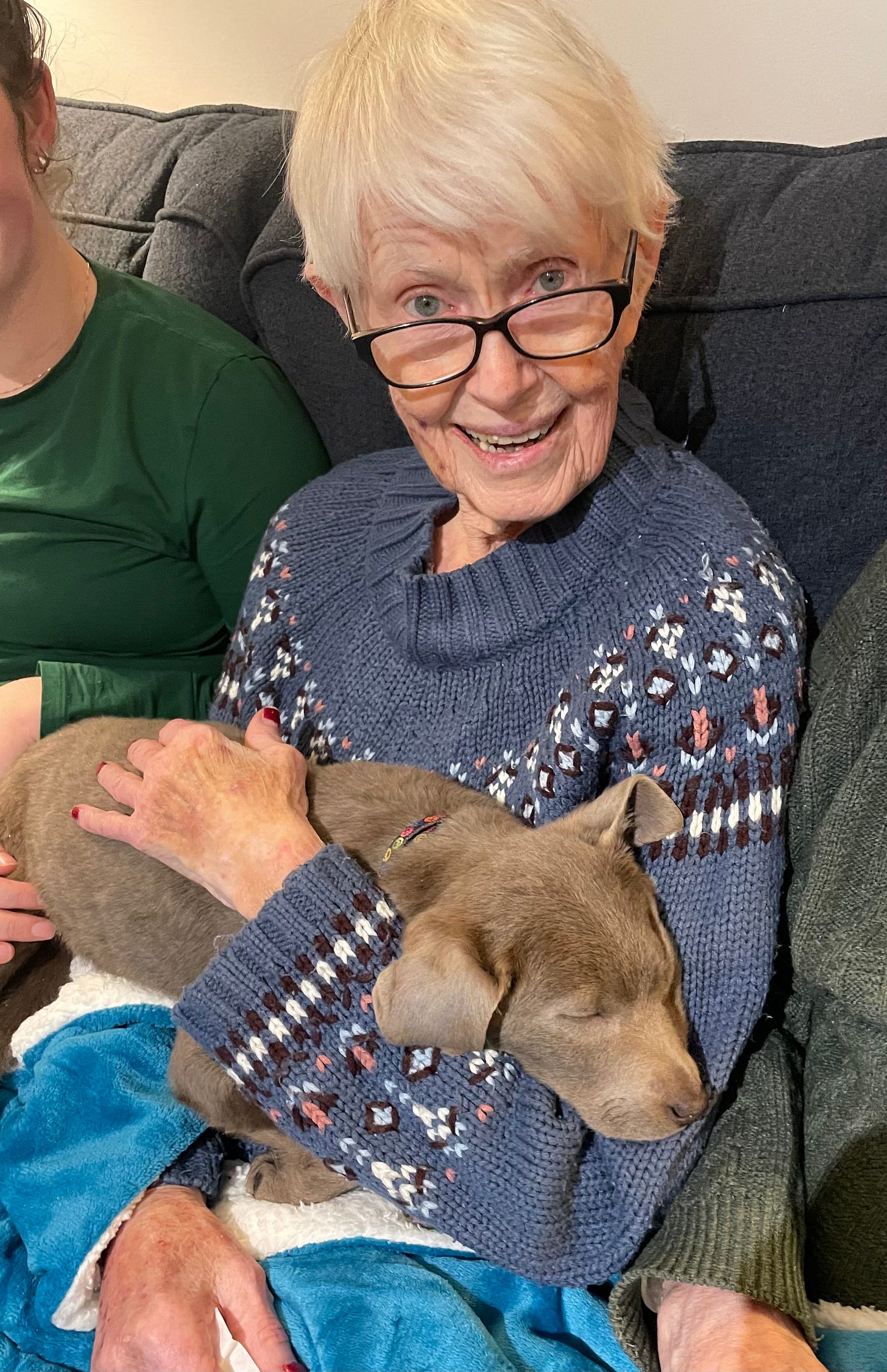
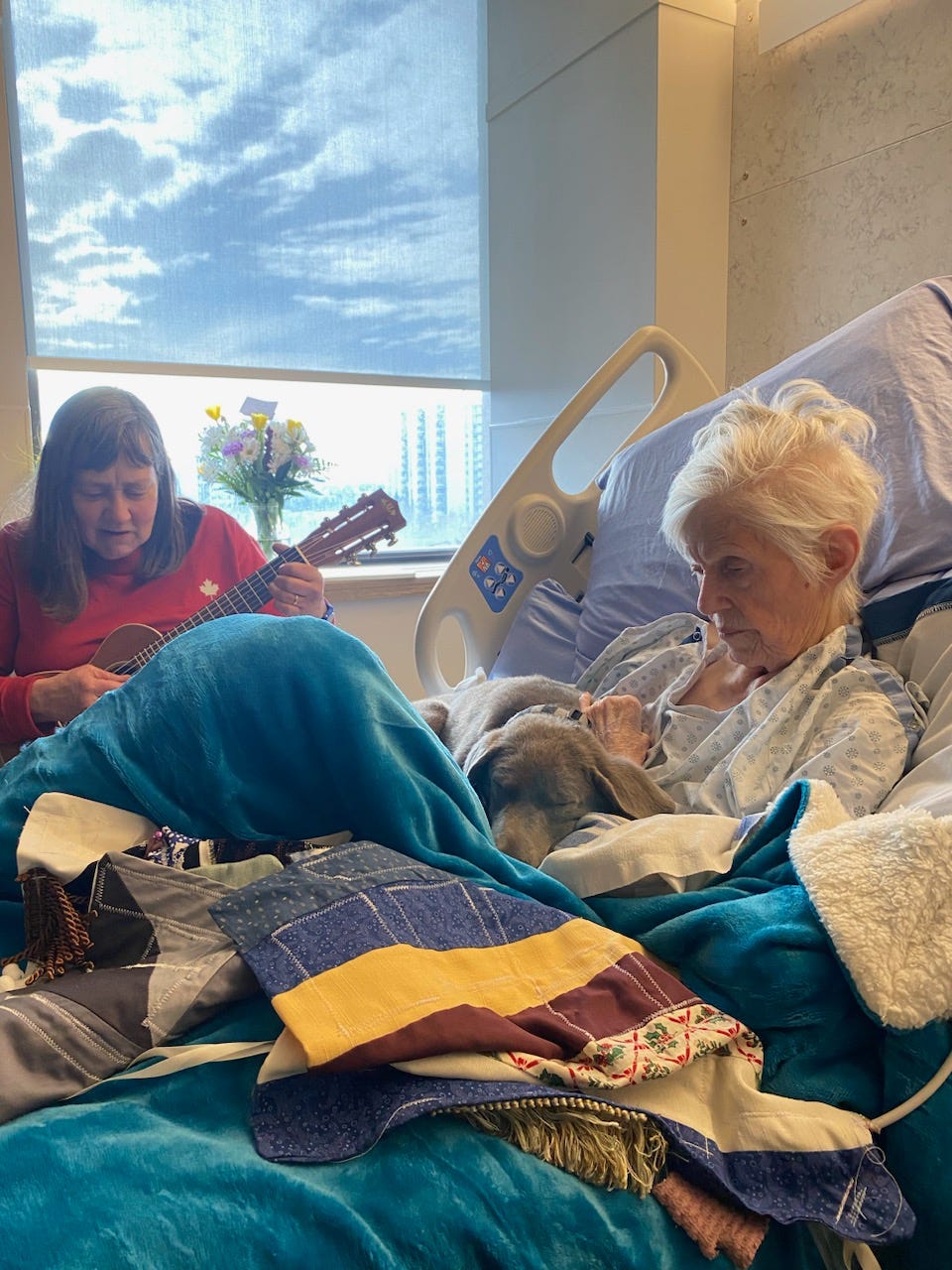
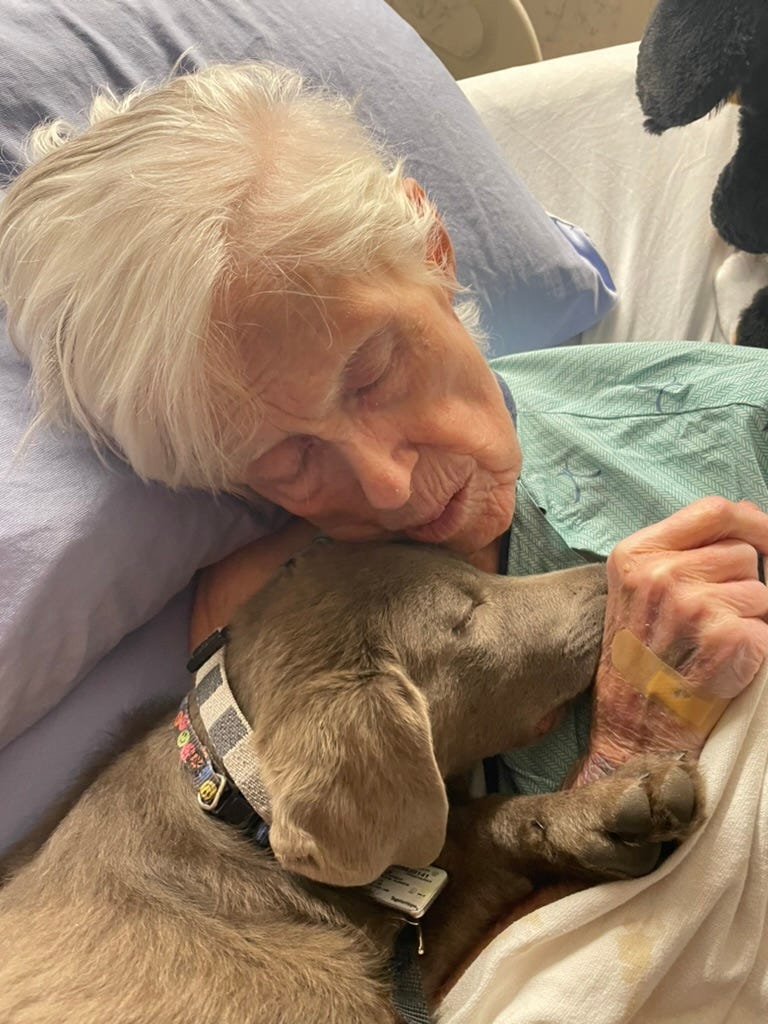
It's beautiful, Debby. A quick note: I do think there's a comic novel in the whole idea of a "Disneyland Daughter," but on a more serious note, we were still finding our feet with all of this at that point, and when you'd come to town to see Mom, you were away from everything with nothing to do but her, and she was so happy to see you that she'd rally and be as close to her old self as she could get and I think part of me wanted that kind of relatively care-free (by comparison) time with her. I 'm really grateful we figured it out - I know a lot of families don't. You're doing an amazing job supporting the Wishart clan through Pat's last act, and I wish I could be closer to support all of you. xxxooo
Oh, Debby, this is absolutely beautiful. You're such a loving daughter and partner. This essay is jeweled, rare, radiant, healing. Thank you.